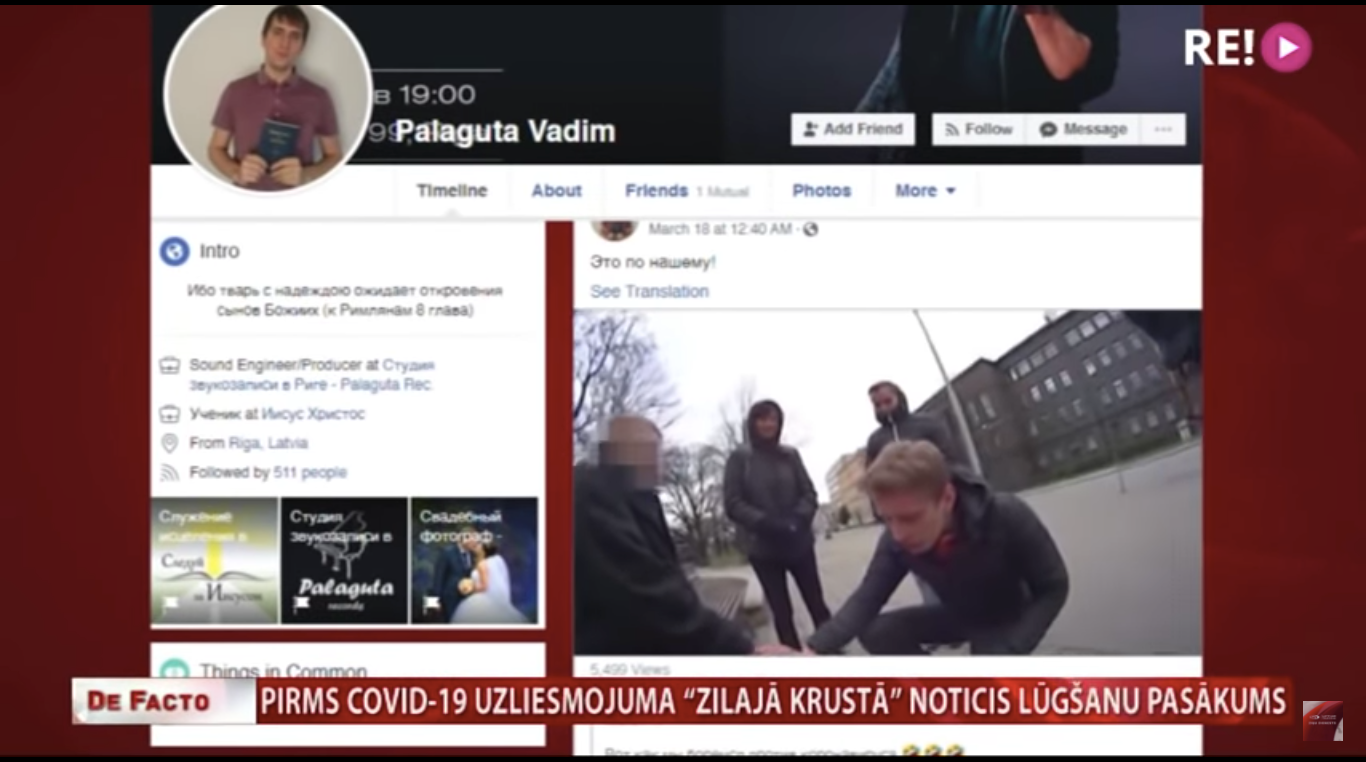The most dangerous aspect of the situation, not to mention the complete lack of social distancing, is that the prayer services typically feature faith healing, where people are “healed” through prayers and physical contact. A few days after the March 15 service, congregation activist Vadims Palaguta and additional youths took to the streets, targeting older and homeless-looking individuals, promising to heal them.
“Such an unusual time for us. Gathering is forbidden, it's quarantine. And I thought – why not go outside and preach the gospel?” said Palaguta on Facebook.
Palaguta's Facebook page contains video of the interactions a few days after the prayer service when he goes around the Central Station and Old Town territory with three additional youths. They find a stranger, stand around them at only an arm's length distance, and one of them touches the stranger in the place where they want to 'heal' them.
The first case at the shelter was diagnosed on March 28, but there are currently 107 shelter residents quarantined on location, and 57 clients and employees have been diagnosed with the coronavirus. Epidemiologists think the first infection case could have happened around March 24, as Centre for Disease Prevention and Control (SPKC) Infectious Disease Risk Analysis Department Director Jurijs Perevoščikovs explains, it couldn't have spread so quickly in one moment.
Yet Palaguta remains convinced of his non-medically certified healing powers.
“You know, at the place where I currently am, two weeks ago we had a very powerful repentance, where 33 people participated. Now all these things happened, all of these sick people – that's just the basis for continuing to work with people,” he said on Facebook. Palaguta's profile also contains an invitation for those infected with the coronavirus to write so that he can heal them.
“You know, the coronavirus is actually so easy to treat! I'm just surprised! For example, you have a 39 degree temperature, pray for him, and in the evening it could already be 37. And he feels very good. The healing happens very fast,” said Palaguta.
The Blue Cross shelter is run in cooperation with the Rīga City Council, which pays for the shelter's services. Welfare Department Director and Quarantine Coordination Commission Vice Chair Irēa Kondrāte confirms that the March 15 prayer service took place, but that since then no events have been held including outside persons.
Palaguta is the only activist preacher currently quarantined at the shelter, and it's unknown whether he has contracted the virus. The activist writes that the first person at the shelter to contract the virus didn't attend the meetings and prayers, but Perevoščikovs maintains that simply living together creates the largest risk.
“In this case it's not so important whether these people were at some religious event, or if they have other contact amongst themselves not observing physical distancing, in our opinion these are greater risks than them participating in something - they just live together,” said Perevoščikovs.
Army tents have been set up on the shelter grounds to house the infected, but they have yet to be used. Instead the sick are sheltered in a separate room. The quarantine will most likely continue through the end of the month. There have been two cases where shelter residents have passed on the infection: one in the hospital, and one infected his mother. One person has died, but it's still unclear whether the death can be attributed to the virus.
The director of the shelter refused to comment, and Palaguta didn't answer either phone calls to the number listed on his website, or to a Facebook message.
As previously reported, the shelter houses people who have lost their homes, people who are suffering from addiction, youth from disadvantaged families, including a large percentage of former prisoners. Shelter representative Maija Smane explained that usually clients have to leave at 8:00 a.m., but as of March 12 everyone was allowed to stay during the day as well, coming and going as they please.
As of April 1 the shelter has been isolated and employees self-isolate from home, while residents will have to undergo a strict 14-day quarantine. “Municipal police will provide supervision. Epidemiologists will continue to work. They're testing clients and employees, working with residents to determine contacts, which is difficult as a majority don't have a permanent residence and employment,” said Health Minister Ilze Viņķele.
According to Viņķele, increased testing is being conducted at other six municipal shelters in Rīga as well. Two are owned by the city, the others are run by partner organizations. If additional cases are found at other shelters, those will also be put under quarantine.





























